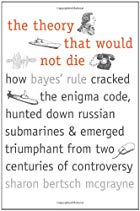Richard Carrier addresses two online criticisms of his book, Proving History: Bayes’s Theorem and the Quest for the Historical Jesus, in a new blogpost, Understanding Bayesian History.
 I took time out from my own chapter by chapter reviews of the book to read a history of Bayes’ Theorem by Sharon McGrayne, The Theory That Would Not Die. I’d like to return to discussions of Bayes’ rule with that additional reading background. One thing that stands out from reading the way Bayes’ theorem has been successfully applied and the social and political struggles it has had for open acceptance (it has much more often been covertly accepted) until today is that the more complexities and nuances their are impinging upon any question, the more appropriate is the use of Bayes’ theorem to help resolve them. That means that those arguments that history is too complex for Bayes to be of use fail to understand that it is complexity and nuance of so many unknown quantities that Bayes assists us in handling. McGrayne’s book also shows us that some of the arguments used against Bayes today are identical to the ones that were used long ago until they were eventually proven unfounded.
I took time out from my own chapter by chapter reviews of the book to read a history of Bayes’ Theorem by Sharon McGrayne, The Theory That Would Not Die. I’d like to return to discussions of Bayes’ rule with that additional reading background. One thing that stands out from reading the way Bayes’ theorem has been successfully applied and the social and political struggles it has had for open acceptance (it has much more often been covertly accepted) until today is that the more complexities and nuances their are impinging upon any question, the more appropriate is the use of Bayes’ theorem to help resolve them. That means that those arguments that history is too complex for Bayes to be of use fail to understand that it is complexity and nuance of so many unknown quantities that Bayes assists us in handling. McGrayne’s book also shows us that some of the arguments used against Bayes today are identical to the ones that were used long ago until they were eventually proven unfounded.
Carrier is responding to criticisms by an atheist-mathematician-with-New-Testament-interests on Irreducible Complexity.
Richard Carrier writes:
When Ian isn’t ignoring the refutations of his own arguments in the very book he’s critiquing, he is ignoring how applications of Bayes’ Theorem in the humanities must necessarily differ from applications in science (again for reasons I explain in the book), or he is being pointlessly pedantic and ignoring the fact that humanities majors need a more colloquial instruction and much simpler techniques than, for instance, a mathematical evolutionist employs.
To illustrate these points . . .
